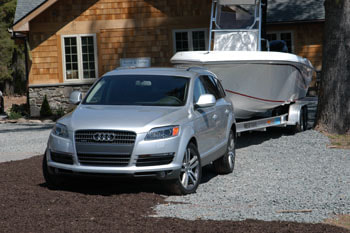 With cold weather oncoming and before the snow flies, now's a good time to winterize your marine motor. Photo by author With cold weather oncoming and before the snow flies, now's a good time to winterize your marine motor. Photo by author With this week being the first week of fall, and if you’re a motorboat owner, be it a fishing or recreational boat, and don’t have plans using it again until next spring, the folks at BoatUS suggest following these guidelines for winter storage. *Freshwater flush: Use a flushing attachment or run the outboard in a tank filled with clean water. *Empty fuel lines and carburetors: With the engine running, disconnect the fuel line from the engine. When the engine dies, the fuel delivery components will be empty, preventing gums from forming in the stagnant gasoline and clogging lines, jets or injectors. * Fog the carburetor intake(s): Before the engine runs out of fuel, spray fogging oil into the carb(s). Fogging oil is an anticorrosive that will protect the internal surfaces of the carb and cylinders. Typically, the engine will run rough just before it runs out of fuel. As that happens, give the carb(s) a heavier shot of fogging oil to insure internal surfaces are fully coated. *Drain cooling passages: Disconnect the flush attachment or remove the motor from the flush tank. With the motor upright, let all water drain out of the pick-up. Open drain plugs (if any) to empty the powerhead and intermediate housing. Crank the motor a couple times by hand or “bump” it with the starter to empty the water pump. Remove the spark plugs and spray fogging oil into the holes to coat the interior surfaces of the cylinders. Rotate the flywheel a few turns to spread the oil onto the cylinder walls. While the plugs are out, it’s the time to check them for corrosion and regap or replace as required. Reinstall the plugs. *Lubricate linkages and electric starter drive mechanism: Clean all pivots and visible gears and protect them for winter with oil or grease per the owner’s manual. *Drain and refill gearcase: Use lubricant specified in the owner’s manual. Fill oil tank. This will prevent condensation from forming inside the tank. *Drain fuel tank and supply lines: Starting the engine in spring with old gasoline is an invitation to problems. Manage to leave your tank(s) close to empty, then drain the fuel that remains. Use it in your snow blower or cars’ tank, but leave the gasoline lines and tanks empty. If emptying the tank completely is not practical for your boat, top if off to 95 percent full. This is particularly important with the introduction of ethanol into the gasoline supply. Gasoline with ethanol is subject to phase separation if water gets into the fuel, which will surely happen with a half-empty tank over the winter. Filling the tank also limits the air space inside the tank and reduces the potential for internal condensation. *Stabilize the fuel: If you leave the tank full, add an appropriate amount of gasoline stabilizer to combat the formation of passage-clogging gums. *Clean and lubricate the propeller shaft: The off-season is the perfect time to have your prop serviced. If the engine will be stored on the boat, take the props off to discourage theft. *Store upright: Laying the engine down risks water draining where it shouldn’t. An engine stand is easy to cobble together. While these suggestions may not pertain to all motorboats, many items are applicable to most gasoline engines.
1 Comment
10/8/2020 07:54:39 pm
These are all great tips when it comes to boats. I am a huge fan of boats, but I am a bigger fan of doing things myself. I love that you made sure to include tips for those who have little experience when it comes to it. I understand that it is a lot of work, but it is not like I do not have time. I just want to thank you for all the tips that you put in here.
Reply
Leave a Reply. |
AuthorNick Hromiak has been an outdoors and automotive writer for over 30 years. He's been published in numerous national and state-wide outdoor magazines and newspapers.
|
Proudly powered by Weebly
 RSS Feed
RSS Feed